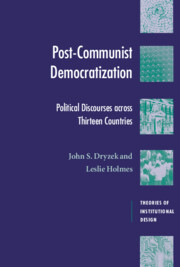Book contents
- Frontmatter
- Contents
- List of illustrations
- Preface
- A note on authorship credit
- Part I Introduction
- 1 The discourses of democratic transition
- 2 Methodology
- Part II Pre-transition countries
- Part III Halting transitions
- Part IV Transition torn by war
- Part V Late developers
- Part VI Trailblazers
- Part VII Conclusions
- References
- Index
2 - Methodology
Published online by Cambridge University Press: 22 September 2009
- Frontmatter
- Contents
- List of illustrations
- Preface
- A note on authorship credit
- Part I Introduction
- 1 The discourses of democratic transition
- 2 Methodology
- Part II Pre-transition countries
- Part III Halting transitions
- Part IV Transition torn by war
- Part V Late developers
- Part VI Trailblazers
- Part VII Conclusions
- References
- Index
Summary
As should be clear from chapter 1, we seek to model the capabilities and dispositions toward democracy of individuals, and map the discursive field of democracy and democratization which these individuals constitute (and are in part constituted by) for each society. Thus we are interested in how democracy looks subjectively to people. Accordingly, we deploy the best-developed paradigm for the investigation of human subjectivity, Q methodology (Q was invented by the psychologist William Stephenson; see especially Stephenson, 1953). Q will be joined with political discourse analysis with the intention of uncovering particular kinds of structures embedded in political language. Our approach is interpretive in that it seeks to come to grips with the way the world looks to the people we study. But unlike interpretive methods such as depth interviewing and ethnography, the interpretations are constrained by statistical results. It should be remembered throughout that statistical tests should inform, but not substitute for, interpretive judgment.
Q methodology
Q methodology is used to model patterns of subjectivity within and across individuals. By way of contrast, familiar R methodology techniques, such as survey research, model patterns within and across variables. In Q methodology, the whole subject's orientation to a particular domain is modeled at once as the basis for the analysis of patterns across individuals. This modeling is done through reference to the subject's reactions to a set of statements drawn from the domain in question – in our case, the domain of democracy and democratization.
- Type
- Chapter
- Information
- Post-Communist DemocratizationPolitical Discourses Across Thirteen Countries, pp. 20 - 30Publisher: Cambridge University PressPrint publication year: 2002



